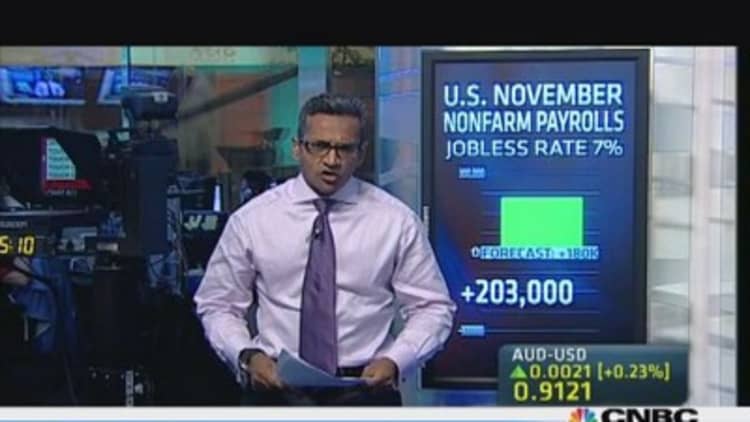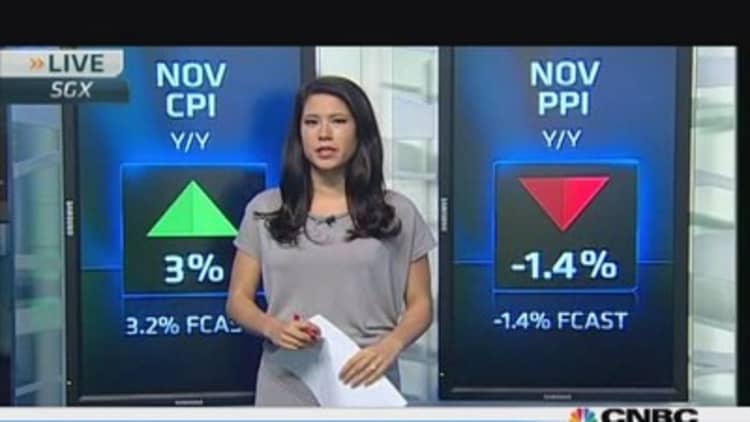Asian equity markets kicked off the week mostly higher on Monday on the back of positive economic data from the world's second largest economy and after strong U.S. jobs data spurred gains on Wall Street at the end of last week.
Investors are now looking ahead to another raft of Chinese data on Tuesday, including November industrial production, retail sales and fixed asset investment.
(Read more: A China data deluge for Asia markets this week)
US jobs boost

Friday's closely-watched non-farm payrolls report showed the U.S. economy created 203,000 jobs in November, much more than expected. The jobless rate fell to a five-year low, while other data showed consumer confidence hit a five-month high.
Experts say November's robust employment could finally trigger the Federal Reserve into action on reducing its bond-buying program soon. Despite those fears, the data helped boost the Dow Jones Industrial Average and rally over 1 percent on Friday.
(Read more: Why Wall Streeters are smiling about next year)
Nikkei up 2.3%
A weaker currency offset pessimism over the latest string of weak economic reports for Japanese investors, leading the benchmark to end at its highest level in nearly a week.
The yen traded around 103 per dollar, within reach of last week's six-month low of 103.37. That sparked 2 percent gains for index heavyweights like SoftBank and Fanuc. Telecoms giant KDDI rallied over 4 percent while Fast Retailing climbed over 3 percent.
(Read more: Dollar-yen to extend rally, December taper not ruled out)

Released just before the market open, growth figures for the July-September period were revised down to an annual 1.1 percent gain, well below preliminary estimates for 1.9 percent. Meanwhile, the nation's current account balance unexpectedly swung to a deficit in October.
Emerging markets in focus
India's benchmark Sensex index rallied 1.5 percent, hitting a new all-time high at 21,483 points as investors cheered critical victories by the Bharatiya Janata Party during weekend state elections. That saw the rupee hit a four-month high of 60.83 per dollar.
Meanwhile, Thailand's SET Index erased opening gains to edge down 0.1 percent after prime minister Yingluck Shinawatra dissolved parliament and called for snap elections.
(Read more: Why Thailand's political strife is far from over)
Shanghai flat
Mainland shares bounced between gains and losses in volatile trade while the yuan scaled a fresh all-time high of 6.0740 per dollar after the People's Bank of China fixed the daily midpoint at a record high for a second consecutive session.
News that Chinese annual inflation slowed to 3 percent in November, from last month's 3.2 percent figure, initially saw the benchmark Shanghai Composite rise above 2,240 points to trade within sight of a new three-month high.
Financials were the main laggards on the index ahead of a key central economic work meeting this week, which is expected to set growth targets for 2014. Pudong Development Bank and Agricultural Bank of China eased over 1 percent each.

In Hong Kong, shares of HSBC were little changed on reports that the lender is considering spinning off its U.K. arm.
(Read more: Forget a slowdown, China's economy set to accelerate)
Kospi rallies 1%
South Korean stocks enjoyed a rebound after closing at a three-week low on Friday. The benchmark Kospi index broke its six-day losing streak to end at the 2,000 mark thanks to strong gains in blue-chip stocks.
Samsung Electronics rallied 1.8 percent while steelmaker Posco added 0.9 percent.
Meanwhile, the rose to its highest level in over two years against the greenback at the 1,054 mark.
Sydney slips 0.8%
Australia's benchmark index closed at its lowest level in over three months, dragged down by a 22 percent fall in shares of the nation's largest insurer. QBE Insurance warned it would post a net loss due to write-downs at its U.S. operation, sparking a sell-off amid other financials.
Westpac closed down 1.3 percent while National Australia Bank fell 0.9 percent.
Education trading provider Vocation rose as much as 10 percent at its debut on the Australian Securities Exchange after raising $230 million at it's initial public offering
.— By CNBC.com's Nyshka Chandran. Follow her on Twitter @NyshkaCNBC

